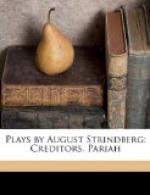Adolph. Pardon me for interrupting you, but—it is wonderful how you resemble Tekla now and then while you are talking. You have a way of blinking one eye as if you were taking aim with a gun, and your eyes have the same influence on me as hers have at times.
Gustav. No, really?
Adolph. And now you said that “no, really” in the same indifferent way that she does. She also has the habit of saying “no, really” quite often.
Gustav. Perhaps we are distantly related, seeing that all human beings are said to be of one family. At any rate, it will be interesting to make your wife’s acquaintance to see if what you say is true.
Adolph. And do you know, she never takes an expression from me. She seems rather to avoid my vocabulary, and I have never caught her using any of my gestures. And yet people as a rule develop what is called “marital resemblance.”
Gustav. And do you know why this has not happened in your case?— That woman has never loved you.
Adolph. What do you mean?
Gustav. I hope you will excuse what I am saying—but woman’s love consists in taking, in receiving, and one from whom she takes nothing does not have her love. She has never loved you!
Adolph. Don’t you think her capable of loving more than once?
Gustav. No, for we cannot be deceived more than once. Then our eyes are opened once for all. You have never been deceived, and so you had better beware of those that have. They are dangerous, I tell you.
Adolph. Your words pierce me like knife thrusts, and I fool as if something were being severed within me, but I cannot help it. And this cutting brings a certain relief, too. For it means the pricking of ulcers that never seemed to ripen.—She has never loved me!—Why, then, did she ever take me?
Gustav. Tell me first how she came to take you, and whether it was you who took her or she who took you?
Adolph. Heaven only knows if I can tell at all!—How did it happen? Well, it didn’t come about in one day.
Gustav. Would you like to have me tell you how it did happen?
Adolph. That’s more than you can do.
Gustav. Oh, by using the information about yourself and your wife that you have given me, I think I can reconstruct the whole event. Listen now, and you’ll hear. [In a dispassionate tone, almost humorously] The husband had gone abroad to study, and she was alone. At first her freedom seemed rather pleasant. Then came a sense of vacancy, for I presume she was pretty empty when she had lived by herself for a fortnight. Then he appeared, and by and by the vacancy was filled up. By comparison the absent one seemed to fade out, and for the simple reason that he was at a distance—you know the law about the square of the distance? But when they felt their passions stirring, then came fear—of themselves, of their consciences, of him. For protection they played brother and sister. And the more their feelings smacked of the flesh, the more they tried to make their relationship appear spiritual.




